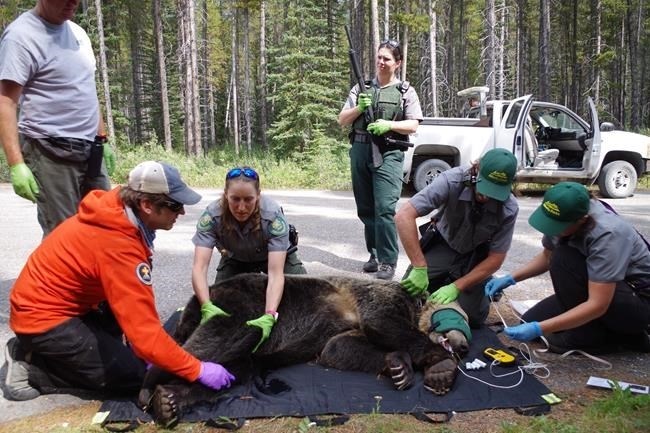
Alberta Environment and Parks staff examine a grizzly bear on Aug. 16, 2017 after it was hit by a car on the Trans-Canada Highway, East of Lac Des Arcs, Alta. on July 28, 2017 in this handout photo. Traffic was whizzing along the Trans-Canada Highway east of Banff National Park around suppertime on July 28 when a grizzly bear known as Bear 164 decided he needed to cross. A car believed to have been going 100 km/h slammed into the bear so hard it was no longer drivable. Then, as if some grizzly guardian angel was on duty, Bear 164 picked himself up and ran off into the trees.
Image Credit: THE CANADIAN PRESS/HO, Alberta Environment and Parks *MANDATORY CREDIT*
September 02, 2017 - 7:00 AM
CANMORE, Alta. - It wasn't the best call Bear 164 has ever made, but this time the hefty grizzly just out of his teenage years got lucky.
Traffic was whizzing along the Trans-Canada Highway east of Banff National Park around suppertime on July 28 when 164 decided he needed to cross.
A car believed to have been going 100 km/h slammed into the bear so hard it was no longer drivable.
"There was fairly significant damage to the front end of the vehicle. We were assuming we were going to have a dead bear on our hands and we'd have to go and recover the body," John Paczkowski, an ecologist for Alberta Environment and Parks, recounted Friday.
But then, as if some grizzly guardian angel was on duty, Bear 164 picked himself up and ran off into the trees.
The bear had been captured a little more than a year before, so parks staff waited for a mortality sensor on its collar to tell them of the bear's fate.
"If that collar stops moving for several hours ... the pulse rate and the beep that we hear changes ... which means the collar has fallen off or the animal has died."
But 164 was still moving the next morning and a conservation officer spotted him walking with just a bit of limp, but no signs of significant injury.
A wildlife veterinarian advised parks staff to give the bear some distance for a couple of weeks, Paczkowski said. If the bruin was injured, he needed time to heal.
The survivor grizzly continued to roam past the mountain town of Canmore, Alta., and into Banff National Park.
On Aug. 16, it was time to see how he was doing. Parks staff located him, darted him and replaced his old collar with a new GPS unit.
"He was really in good shape when we had a look at him," Paczkowski said.
"He had really put on a lot of weight. He had grown in girth and in length and in all different ways. He was a really nice, healthy-looking bear."
The grizzly, who's about seven years old, had almost doubled his weight to about 135 kilograms from when he was first collared 14 months earlier.
Paczkowski attributes that to a "really abundant berry crop."
"He's just in those thick berry patches gorging."
Paczkowski said male grizzlies can live to 20 or more years if they avoid traffic, but 164 lives a bit of a "high-risk lifestyle."
He spends most of his time away from humans, but has made secretive and swift forays into Banff's Bow Valley around highways and railways.
It's quite possible this bear, just into adulthood, will have learned to retreat once more into the silence of the back country, Paczkowski suggested.
"A traumatic experience like that would probably wisen him up to trying to cross the highway," he said.
"As he matures into an adult male his roam range will increase and he'll move further and wider afield and hopefully he has a productive life."
— By Sylvia Strojek in Edmonton
News from © The Canadian Press, 2017